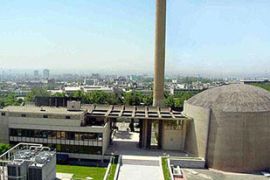US hopes for Iran nuclear talks
State department says it is willing to follow up on uranium swap plan.

“There have been contacts between Iran” and Catherine Ashton, the European Union’s high representative, about a “prospective meeting,” he said.
Last October’s meeting was called to discuss the proposed deal, which would have seen Iran send some of its low-enriched uranium to Russia and France for further purification into fuel for a medical isotopes reactor in Tehran.
Necessary fuel
The six major powers say that Iran could be using its uranium enrichment programme as a cover to develop nuclear weapons, but Tehran insists it is entirely peaceful and is designed to meet the country’s civilian energy needs.
In February, Iran announced that it had started the further enrichment of its uranium stocks to about 20 per cent purity, from about 3.5 per cent previously, raising concerns about the use of the nuclear material.
But Ahmet Davutoglu, the Turkish foreign minister, said on Wednesday that Iran had given its assurance that it would stop enriching uranium to 20 per cent if the swap was agreed.
“Another important message given by [Iranian foreign minister Manouchehr] Mottaki during his visit to Turkey was that if the Tehran deal is signed and Iran is provided with the necessary fuel for its research activities, then they will not continue enriching uranium to 20 percent,” he said.
Iran sent a letter to the International Atomic Energy Agency in Vienna on Monday, saying it was ready to negotiate the details of exchanging 2,646 pounds of its own three percent enriched uranium for 265 pounds of 20 per cent enriched uranium.
The state department’s announcement comes weeks after Barack Obama, the US president, signed a bill imposing the toughest sanctions on Iran over its nuclear programme.
The legislation sought to choke off Iran’s access to refined petroleum imports, including gasoline and jet fuel.
It also bans US banks from doing business with foreign banks that provide services to Iran’s elite Revolutionary Guards.
“With these sanctions – along with others – we are striking at the heart of the Iranian government’s ability to fund and develop its nuclear programmes,” Obama said while signing the bill at the White House.
The US sanctions, along with those approved by EU foreign ministers on Monday, are intended to squeeze Iran’s petroleum imports and increase its international isolation.
Ineffectual sanctions
Mohammad Souri, the chairman of Nitc, Iran’s biggest crude oil tanker operator, said the punitive measures against the Islamic republic were ineffectual and that the tanker operator was pressing head with expansion plans.
Souri told the Reuters news agency that Nitc, which was founded in 1955 and fully privatised in 2000, was not involved “in any way” in the import of petroleum products into Iran.
“It is therefore unaffected by sanctions and remains a legitimate business partner for companies in the EU and elsewhere,” he said in an interview.
Russia slammed the sanctions saying they would undermine “our joint efforts to seek a political and diplomatic settlement around Iran’s nuclear programme”.
In a statement, Russia’s foreign ministry also said the measures show “disdain for the carefully calibrated and co-ordinated provisions of the UN Security Council resolutions”.
The use of sanctions outside of the UN Security Council framework is “unacceptable,” the statement said.